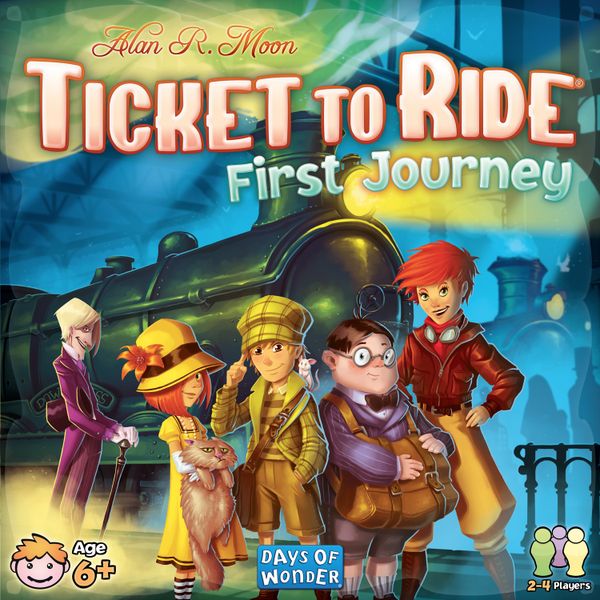Ticket to Ride: First Journey (U.S.) (2016) Board Game
Ticket to Ride: First Journey (U.S.) is a children’s adaptation of the popular board game Ticket to Ride. It was released in 2016 and designed by Cyrille Daujean and Jean-Baptiste Reynaud. The game is published by Days of Wonder and is suitable for players aged 6 and above. It falls under the categories of Children’s Game and Trains, featuring hand management, network and route building, and set collection mechanics.
Game Components of Ticket to Ride: First Journey
How To Setup Ticket to Ride: First Journey
To set up the game, place the gameboard in the middle of the table. Each player chooses a color and takes 20 trains of the corresponding color. Shuffle the train cards and deal four cards to each player, placing the rest facedown to form the train deck. Shuffle the ticket cards and deal two cards to each player, keeping them hidden. Place the rest of the ticket cards face down on the table to form the ticket deck. The four coast-to-coast bonus ticket cards are placed next to the gameboard. The youngest player starts the game.
Gameplay Mechanics and Game Objective
Gameplay Mechanics
Game Objective
Player Experience
Ticket to Ride: First Journey is designed to be an introduction to the Ticket to Ride series, making it easy and quick to play. The game simplifies the rules and reduces the complexity of routes, making it accessible for younger players. The gameplay is fast-paced, with a typical playtime of 15-30 minutes. Players collect train cards, claim routes, and try to connect cities shown on their tickets. The absence of negative scoring for uncompleted tickets and the ability to discard and draw new tickets make the game less stressful and more enjoyable for new players.
Pros
Cons
Personal Thoughts on Ticket to Ride: First Journey
Ticket to Ride: First Journey is ideal for families and new players looking to enter the world of board games. It is a great introduction to the Ticket to Ride series, offering a fun and accessible way to learn about train-themed strategy games. While it may lack the strategic complexity of the original game, it provides a delightful and educational experience for younger players. For those seeking a more challenging experience, the original Ticket to Ride might be more appealing, but for a family-friendly outing, First Journey is an excellent choice.
We are supported by our audience. When you purchase through links on our site, we may earn an affiliate commission, at no extra cost for you. Learn more.

